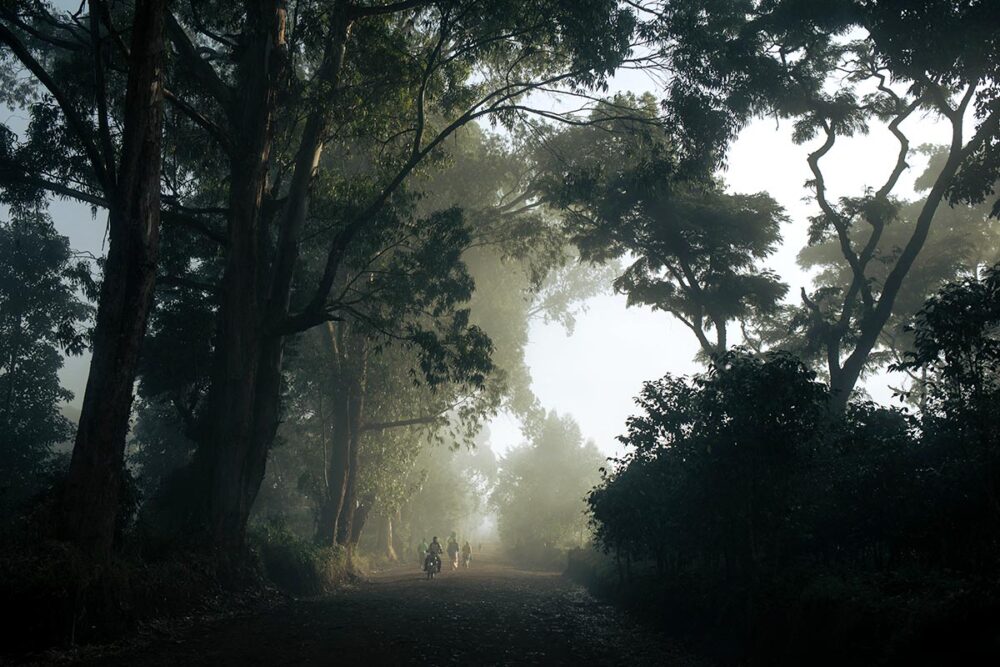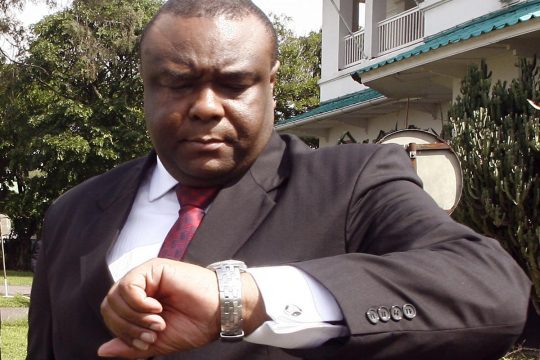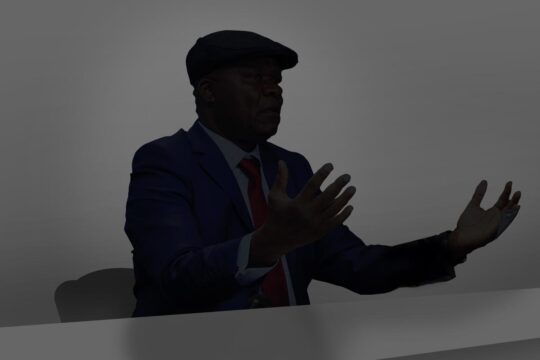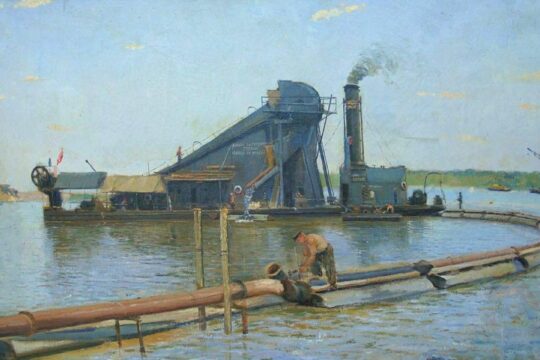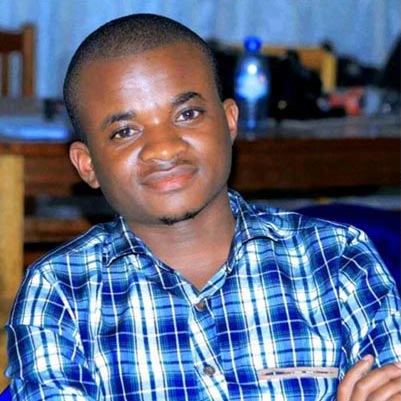It is November 10, 2025, in the centre of Mambasa, capital of one of the five regions of gold-rich Ituri province, eastern Democratic Republic of Congo (DRC). At this crossroads of four roads going to Beni (North Kivu) in the south, Kisangani (Tshopo) in the west, Isiro (Haut-Uélé) in the north, and Bunia (Ituri) in the east, a gentle sun rises over this region lost in the heart of the rich equatorial forest. This is a sign of good weather for the people of Mambasa, who need the sun to hunt, cultivate the land, extract gold, and conduct their trade.
Remembering what this place was like 20 years ago, we can see it is being reborn. Resilient traders, mainly from neighboring Kivu, are building it, along with the indigenous people. New buildings are springing up, erasing traces of the wars that ravaged the city in the early 2000s. “On Hundred Metres Avenue, for example, there weren’t as many houses and shops,” says a resident who lived here in 2002. “Some houses are built over mass graves.”
It is particularly in Mambasa that the crimes were committed for which ex-rebel leader and former Congolese minister Roger Lumbala has been on trial since November 12 in Paris. He is charged with complicity in crimes against humanity committed by his troops during the Second Congo War (1998-2003). Six thousand kilometres from the French capital, on the eve of the trial, people are not talking about it here, not even in popular spots like the Mabo-ville esplanade or Rachel City. Men and women gather there, as they do every evening, for a few drinks to talk about life, love, and business -- but not about the Lumbala trial. This trial may have turned the international media spotlight on this corner of Ituri for the first time, but in such an isolated place with no communication infrastructure, there is little enabling people to follow the trial.
“I will never forget that sadness”
When asked if they know Lumbala, elderly and indigenous people say this question brings back terrible memories of the military operation known as “Effacer le Tableau” (Wipe the Slate Clean), carried out by troops of Lumbala’s RCD-N (Congolese Rally for Democracy-National), supported by those of Jean-Pierre Bemba’s MLC (Congolese Liberation Movement), which aimed to conquer territory occupied by the APC (Congolese People’s Army) of the RCD-KML (Congolese Rally for Democracy-Kisangani Liberation Movement). This was but a part of the bloody, fluctuating, and ever-changing history of the armed groups that have been terrorizing and ravaging the region for 30 years.
One victim who lost his father, buried in a mass grave, agreed to talk to us about his family’s ordeal. DKK, as we will call him to preserve his anonymity, was 18 at the time. Today he is father of seven children and lives with his family in a hut on the outskirts of Mambasa, near the road to Kisangani. “It was three weeks before the start of the school year when Roger Lumbala’s fighters came from Bafwasende to oust Mbusa Nyamwisi’s APC. My brothers, my mother and I took refuge in a forest near the Binasi River. My father, who had stayed in the city, was arrested by Lumbala’s soldiers and they subjected him to forced labour. Along withother neighbours, they had to grind cassava flour and draw water for the rebels, who eventually killed them when they realized they were Nande, the same ethnic group as Mbusa Nyamwisi. Red Cross rescue workers buried them in a mass grave and came to tell us the sad news in the place we were hiding,” he says. “For a week, we were unable to mourn. I will never forget that feeling of sadness."
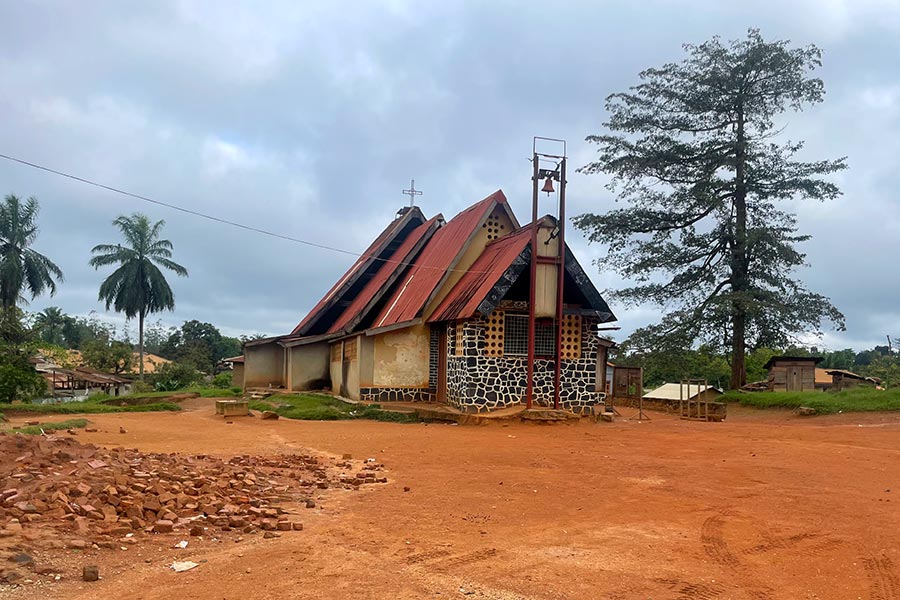
Even the graves were looted
We spoke with seven victims who witnessed the atrocities attributed to Lumbala’s men in central Mambasa, in Butiaba 2 (6 km from Mambasa, towards Beni), Mandima (6 km from Mambasa, on the road to Bunia) and Epulu (75 km from Mambasa, on the road to Kisangani). They may not remember the date of hostilities, but they all agree on several facts: the clashes began a few weeks after the start of the school year; they pitted Lumbala’s forces against those of Mbusa Nyamwisi; and Lumbala’s offensive took place in two phases. The first, conducted independently and marked by countless crimes (looting, rape, killings), enabled the RCD-N to conquer central Mambasa. The second was carried out with Jean-Pierre Bemba’s support and enabled Lumbala’s men, who had been pushed back to Epulu by the APC, to return with force and advance towards Komanda and Mangina.
“During their first offensive, they looted the whole of Mambasa,” recalls DKK. “They went from door to door robbing shops and houses. They took my father’s business and his crops, especially peanuts, and we were left with only four goats and two bicycles.” The goats were sold so as to evacuate his mother and younger brothers to Butembo (North Kivu). The older ones were forced to walk 200 km on foot. Some residents buried their valuables in holes they dug at home, or even in a public cemetery. When the Lumbala fighters discovered this, they began digging them up. “In the Catholic mission cemetery, they even opened graves to make sure there were no objects hidden there,” says LLJ, another victim who was at the time studying tailoring at the Mambasa Catholic mission and was housed there. “I saw them digging up bodies and human remains.” Scenes he hopes he will never see again. LLJ claims to have seen RCD-N men slaughter some 30 cows belonging to the Catholic mission and leave them to rot.
“During the looting, some people mistook caustic soda for wine and wanted to drink it; others thought lotion was mayonnaise. They shot chickens and goats at point-blank range,” says TUK, another victim.
Summary executions and rape
The “Effacer le Tableau” forces, as they are called in Mambasa, took TUK’s wife “Rose”, whom he has never found. TUK leads us to the enclosure that served as headquarters for Freddy Mopao, the renowned commander of the RCD-N forces. Located opposite the Directorate General of Migration in a neighbourhood of government offices, it is now home to the Hotel Les Pygmées. “One morning, while I was looking for my wife, I saw soldiers arrive here with eight people, including my neighbour Papa François,” says TUK. “These civilians were drunk, and the soldiers asked them what they thought of their leader Freddy Mopao. Without hesitation, one of the old men replied in his drunken state that the inhabitants no longer wanted Mopao, who was causing them suffering. Upon hearing this, Mopao emerged with a gun. He told his soldiers to take them behind the house here, and we heard eight gunshots. Rushing to look, we saw eight lifeless bodies, and all of them were buried in a mass grave behind this house. If you don’t believe me, I can show you where the mass graves lie on this plot and on the road to Binasi River. If you open them, you will find human remains. None of the graves have ever been opened, and everything is still there. Behind us on Hundred Metres Street, they are starting to build on top of mass graves.” TUK says he had connections with the rebel headquarters, having friends in their ranks with whom he had fought in the AFDL, the rebels that brought Laurent-Désiré Kabila to power in 1997 and were later recruited by Lumbala.
Two victims then led us to the sites of mass graves where their relatives were buried with other victims, notably in the grounds of Christ-Roi Catholic church and in a neighbourhood of Epulu, in the Okapi Wildlife Reserve. While buildings have been erected over some mass graves, others are located on private land. This makes it difficult for the victims’ families to maintain or preserve them, undermining remembrance. “Before 2011, we used to come here to pay our respects with other families of victims buried in this mass grave,” says DKK. “My father is buried here. But I don't know if we will be able to preserve this place, because the priests have built their convent here and the traces are beginning to disappear. All I have as a landmark is this avocado tree in front of me.”
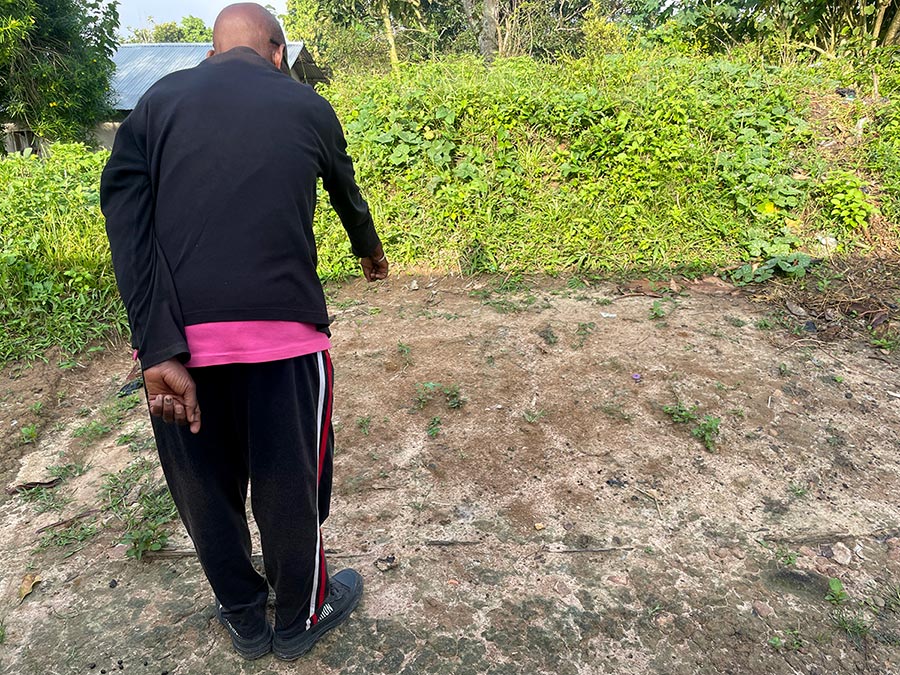
LLJ, who lived at the Catholic mission, says he witnessed the systematic rape of women in the mission cemetery where the rebels found them. “I still feel uncomfortable talking about it. It was the first time I had ever heard of a woman being subjected to such a thing. We saw rebels raping nuns,” he says but is stopped by his brother, sitting next to him, who is embarrassed by LLJ mentioning the raped nuns. “At least don’t mention their names,” his brother pleads.
Hunting pygmies and cannibalism
“My brother was an environmental warden and fed the okapis,” says our witness in Epulu, eyes fixed on the mass grave of which traces still remain.
Epulu is an emblematic village in the Reserve, where the rebels came and where they retreated after the first offensive failed. Here there are camps of indigenous Pygmy people, who have also suffered extreme violence. Our visit to one of these camps coincides with a ritual ceremony. Pygmies are calling for ancestral sanctions against a son-in-law of the village who killed his wife, their daughter, with a dagger. The camp leader forbids us from taking any pictures so as “not to anger the ancestors”, but agrees to tell us what his family suffered during Operation “Effacer le Tableau”.
“Wipe the slate clean really meant wipe everything out,” says the Pygmy leader, who speaks French well. “We were in Epulu when they came, and when we heard gunshots we decided to take our families into the forest, away from the road. Unfortunately, they too knew the forest. They followed our tracks until they saw my younger brother and sister. There were four soldiers, and they all took turns raping my younger sister. Even worse, they asked my brother to have sex with his sister. Since that day, my sister has been ill.” He is determined to see that she obtains justice and compensation. “We must be compensated,” he replies when asked what they expect from the Paris trial.
In Ituri, as in North Kivu (Beni, Butembo, and Lubero), when people talk about Operation “Effacer le Tableau” (Wipe the Slate Clean), what comes most to mind are the acts of cannibalism that Lumbala and Bemba soldiers allegedly committed against the indigenous Pygmy peoples. In Butembo, in popular Kinande (language spoken by the Nande, majority ethnic group in the Far North), inhabitants describe smaller people like Pygmies as Chalya Cha Bemba (Bemba’s food). But in Mambasa, we did not meet any witnesses who could attest to these acts of cannibalism, and the Pygmy leader we spoke to did not corroborate these accounts.
TUK claims it was the soldiers themselves who told the inhabitants they had eaten pygmy flesh in a village between Epulu and Ebiane, on the road to Kisangani. “Pygmies are said to have refused to serve as trackers for Effacer le Tableau soldiers, who wanted them to show a shortcut through the forest to Mambasa. When they refused, the soldiers called them APC accomplices. They killed them and ate their flesh. In Mambasa, to force us to obey, they said to us: ‘We have eaten pygmies, now what about you too?’”
The “king of fools”
Operation “Effacer le Tableau” was jointly conducted by troops from the RCD-N and MLC of Jean-Pierre Bemba, a major figure in the DRC wars who became vice-president of the country, was arrested, tried, convicted, acquitted by the International Criminal Court (for crimes committed in the Central African Republic) and is now deputy prime minister. But several residents say that the MLC troops only arrived in the second phase of the operation, as reinforcements for Lumbala’s men who had just lost Mambasa.
“As they withdrew from Mambasa, Lumbala’s troops led by Freddy Mopao wrote on the walls of houses: ‘Keba na retour’ (Beware of the return, in Lingala),” says TUK. “One day, we learned that they were coming back and had received reinforcements. And when they reached the Epulu bridge on the Mungbere road, Mambasa residents began to leave, remembering the crimes they had suffered during the first offensive.”
The troops that came to the rescue of Lumbala’s men were none other than the MLC soldiers, commanded by feared colonel Ramsès Widdy Divioka, known as the “King of Fools”. He also commanded units known for their violence and indiscipline, according to a victim whose pharmacy was looted in Butiaba 2 -- a village where the “King of Fools” had set up his headquarters in a Catholic chapel that no longer remains.
“We were confused when they arrived. Sometimes they were called Bemba’s soldiers, sometimes Lumbala’s soldiers. But they were all the same: they killed three people in our village, Butiaba 2, and tortured our priest Franck. They also raped my neighbour, who spent three months in a hospital bed. She is still in Butembo alive, but she can no longer work because she has been too ill ever since,” says a victim who has lived in Butiaba 2 since 1961. ”Effacer le Tableau wiped us out completely: our possessions, our people. They came to wipe us out.”
Helicopter visits and promises
Like this victim from Butiaba 2, TUK from Mambasa and DLJ from Epulu claim that, during the conquest of the localities, Lumbala came by helicopter to bring his men ammunition and hold popular meetings defending his armed struggle and seeking support from the communities. “Five days after the first capture of Mambasa, Lumbala came down in a helicopter, pretending to sympathize with the pillaged people. He came with a few bags of salt, soap and Rina (a brand of vegetable oil consumed in the east) that were not enough for everyone,” says TUK.
“Lumbala arrived here in Epulu by helicopter with his men in charge of the press and mining, Mr. Gina. He came to resupply his troops, but still asked forgiveness for the harm done. He was wearing military uniform and speaking Kiswahili. We were surprised. He justified his struggle, saying he had come to liberate us by erasing the APC’s mistakes. Hence operation Effacer le Tableau,” says a resident of Epulu who says he lost all his savings during the war. “The second time, he said he had come to help us. He only had 50 kg of salt and a pack of cigarettes. Each household received only one spoonful of salt. He promised to return with much more aid, which never arrived. But in his meeting, he defended his troops.”
Need for reparations
“With my field, I had enough to feed my family and invest. During the war, many residents took refuge in my field and everything was used to feed them. If I remain poor, it is because Effacer le Tableau imposed war on us. Otherwise, I would have my house,” says DLJ, who grew rice, beans, and bananas. One victim recalls how neighbours had all their wealth plundered, leaving them with nothing. “Old Lusasa and Gaspard became poor, whereas they used to be wealthy,” the victim tells us. “Everything was looted. Gaspard died of a heart attack because he couldn’t accept that he had become poor again.”
“What we endured in Mambasa are crimes that must be tried. Unfortunately, our justice system is sick and has not been able to bring justice for 23 years,” says TUK. “May international justice help us,” says a victim who is preparing to travel to France to testify against Lumbala. And TUK insists: “Given how many died, justice must be done. This must not go unpunished.”
DKK believes his father’s death has undermined the family in a way that also deserves compensation. “I was the smartest in the family. When our father died, my older and younger brothers were forced to drop out of school to support me. I finished university, and it became like a moral debt: the whole weight of the family rests on my shoulders. If we lack stability now, it’s because we lost the pillar of the family,” he laments.
Victims in Epulu say Lumbala still has relatives in the Bafwasende region, his main stronghold, who are tracking down victims and witnesses. We have not been able to verify these allegations. But Jean-Pierre Bemba is now deputy prime minister in Kinshasa and has the ear of President Félix Tshisekedi. Some victims, including the Pygmy leader, say they fear reprisals.


